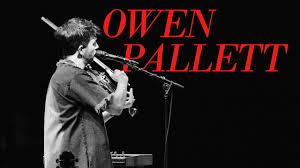 SOUNDTRACK: OWEN PALLETT: Tiny Desk (Home) Concert #113 (November 17, 2020).
SOUNDTRACK: OWEN PALLETT: Tiny Desk (Home) Concert #113 (November 17, 2020).
 I know Owen Pallett from their performance at Massey Hall. It was beautifully layered orchestral pop.
I know Owen Pallett from their performance at Massey Hall. It was beautifully layered orchestral pop.
Typically they loop the songs to make them bigger, but or this set, Owen changed things up.
Owen recorded four songs in multiple stages on different instruments: first, they played acoustic guitar and sang; then they performed the songs again, but this time on violin and viola; finally, Owen layered the recordings in post-production, not really knowing what the final versions would sound like. They explain the whole process, charmingly, between songs.
The setlist here is complete different from the one from Massey Hall. Although like a that show, he mixes some songs from his first album (released as the band Final Fantasy) as well as he official solo songs.
From a bedroom in Toronto, Owen traverses their musical history, opening with a dreamy song from 2005’s debut album (as Final Fantasy), Has a Good Home,
His guitar melody is beautiful and the layers of strings make this song feel big and pastoral. His voice is gentle and lovely.
Before the second song, “Cliquot,” he says that in 2007, he went to Quebec with the band Beirut to write songs and record his EP Spectrum, 14th Century. and Beirut’s album The Flying Club Cup. Zach Condin gave him an instrumental and asked Owen would write a melody, lyrics and sing lead. They don’t play it live probably because it’s really really gay and Zach doesnt want any more werotci fan fiction writen about the two of them.
Beautiful string melodies in between verses.
“Perseverance of the Saints” is from Owen’s latest record, Island. Here it’s transformed from arpeggiated piano to guitar, and I love the tone it sets.
It is so gentle with swirling strings and a gentle melody.
Owen not only performed each instrument in separate takes, but also did all the production work: recording, filming and editing. A remarkable talent captured in a candlelit bedroom.
“Song for Five & Six” is from his 2014 album In Conflict. He says when he loops live things to end to get “overwritten and annoying,” so he’s looking forward to playing this with arpeggiated guitar instead of synth.
This song was written about an incident he saw on the Orkney Islands. After playing some kind of ball game, the men and boys, covered in mud, would climb on the back of a flatbed truck and ride through town banging sticks on the side of the truck. He thought it was a beautiful image and probably the only pure thing that the men have ever done.
He sings in a gentle falsetto and there’s some gorgeous strings.
[READ: December 19, 2020] “The Snowstorm”
This year, S. ordered me The Short Story Advent Calendar. This is my fifth time reading the Calendar. I didn’t know about the first one until it was long out of print (sigh), but each year since has been very enjoyable. Here’s what they say this year
You know the drill by now. The 2020 Short Story Advent Calendar is a deluxe box set of individually bound short stories from some of the best writers in North America.
This year’s slipcase is a thing of beauty, too, with electric-yellow lining and spot-glossed lettering. It also comes wrapped in two rubber bands to keep those booklets snug in their beds.
As always, each story is a surprise, so you won’t know what you’re getting until you crack the seal every morning starting December 1. Once you’ve read that day’s story, check back here to read an exclusive interview with the author.
It’s December 19. Alexander Pushkin, author of Eugene Onegin, died in 1837 and so was unreachable for comment. [Click the link to the H&O extras for the story].
I have not read any stories by Pushkin before and I really enjoyed this one (translated by T. Keane).
Set in 1811, this story revolves around a young woman who has fallen in love with a young man whose station is far beneath her. And such great quotes!
Maria Gavrilovna had been brought up on French novels, and consequently was in love. The object of her choice was a poor sub-lieutenant in the army, who was then on leave of absence in his village. It need scarcely be mentioned that the young man returned her passion with equal ardor, and that the parents of his beloved one, observing their mutual inclination, forbade their daughter to think of him.
They wrote to each other every day. At last they decided that they would run off and get married in secret. They would then hide away for a time and come back to throw themselves at their parents’ feet for their blessings. (more…)


